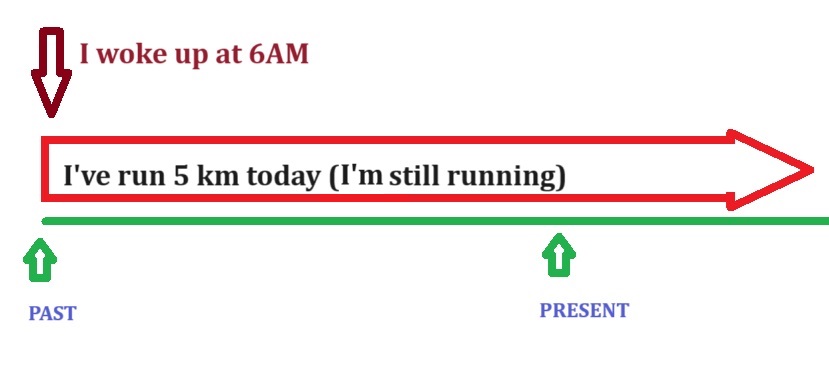PRESENT PERFECT AND PAST SIMPLE
The present perfect can be used:
- To give new information or “news.”
- To talk about a repeated action that continues to happen.
- To talk about an event that started in the past and is still happening now.
Examples:
- Where’s Ana? I haven’t seen her lately. She’s just left for a trip in the US (giving information or news).
- Have you been back to your native village since you left? I have been back to my native village to visit every year since 2000 (Repeated action that continues to happen).
- I’ve run 5 km today. (I started running an hour ago, I’m not done running yet)
The past simple tense is used to talked about a completed event that happened in the past.
- When did Ana leave? She left 2 weeks ago (a completed event that happened in the past).

TEXT USING PRESENT PERFECT AND PAST SIMPLE
NOTE: Most of the verbs in the text are in present perfect tense, because the events continue to happen. Only 3 verbs are in past simple tense; they are related to events that happened and terminated at precise points in time (2016, 2012 and 2015).
Artificial intelligence (AI) is the field of computer science that aims to create machines and systems that can perform tasks that normally require human intelligence. AI has developed rapidly in the past few decades, and has made significant impacts on various domains such as medicine, education, entertainment, and more.
One of the main achievements of AI development is the creation of deep learning, a branch of machine learning that uses multiple layers of artificial neural networks to learn from large amounts of data. Deep learning has enabled AI to perform tasks such as image recognition, natural language processing, speech synthesis, and more, with high accuracy and efficiency. The term deep learning was coined by Geoffrey Hinton in 2006, and he is widely regarded as the father of deep learning. He and his collaborators won the ImageNet Challenge in 2012, a competition that tests the ability of AI systems to classify images.
Another milestone of AI development is the emergence of artificial general intelligence (AGI), which is the hypothetical ability of an AI system to understand and perform any intellectual task that a human can. AGI is considered the ultimate goal of AI research, and has been pursued by many researchers and organizations. Some examples of AGI projects are OpenAI, a research company that aims to create and ensure the safe use of AGI, and GPT-3, a deep learning model that can generate natural language texts on various topics and tasks. OpenAI was founded in 2015 by a group of prominent tech entrepreneurs and researchers, such as Elon Musk and Sam Altman. GPT-3 was released in 2020, and is the third and most advanced version of the Generative Pre-trained Transformer (GPT) series.
AI development has also faced some challenges and limitations, such as ethical issues, social implications, and technical difficulties. Some of the ethical issues include the potential misuse of AI for malicious purposes, the impact of AI on human dignity and rights, and the responsibility and accountability of AI systems and their creators. Some of the social implications include the effect of AI on employment, education, and culture, and the need for public awareness and education on AI. Some of the technical difficulties include the lack of explainability and transparency of AI systems, the difficulty of ensuring the reliability and robustness of AI systems, and the complexity and cost of developing and maintaining AI systems.
AI development is an ongoing and dynamic process that has changed and will continue to change the world in many ways. AI has brought many benefits and opportunities, as well as challenges and risks, to humanity and society. It is important for researchers, policymakers, and the public to work together to ensure that AI is developed and used in a responsible and beneficial manner.
Text created by Bing Chat. REF : https://en.wikipedia.org/wiki/Geoffrey_Hinton : https://en.wikipedia.org/wiki/ImageNet#ImageNet_Challenge : https://openai.com/about/ : https://en.wikipedia.org/wiki/GPT-3
PRONUNCIATION AUDIO
Select each one of the words in bold characters with your mouse to hear its pronunciation, then click on the AUDIO link above to hear it in a sentence:
Artificial intelligence (AI) is the field of computer science that aims to create machines and systems that can perform tasks that normally require human intelligence. AI has developed rapidly in the past few decades, and has made significant impacts on various domains such as medicine, education, entertainment, and more.
One of the main achievements of AI development is the creation of deep learning, a branch of machine learning that uses multiple layers of artificial neural networks to learn from large amounts of data.
EXERCISES
Link for online exercise
A short story of Brighton – by Oxford Learner’s Dictionaries
